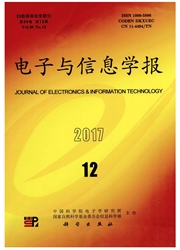

 中文摘要:
中文摘要:
稀疏表示已成功应用于说话人识别领域。在稀疏表示中,构造好的字典起着重要的作用。该文将Fisher准则的结构化字典学习方法引入说话人识别系统。在判别字典的学习过程中,每一个字典对应一个类标签,因此同类别训练样本的重构误差较小。同时,保证训练样本的稀疏编码系数类内误差最小,类间误差最大。在NIST SRE2003数据库上,实验结果表明该算法得到的等错误率是7.62%,基于余弦距离打分的i-vector的等错误率是6.7%。当两个系统融合后,得到的等错误率是5.07%。
 英文摘要:
英文摘要:
Motivated by the success of sparse representation in speaker recognition, a good dictionary plays an important role in sparse representation. In this paper, the structured dictionary learning is introduced to speaker recognition based on the Fisher criterion. In the process of learning the discrimination dictionary, each sub-dictionary of the learned dictionary corresponds to a class label, so the reconstruction error of the same training samples is small. Meanwhile, the sparse coding coefficients have small with-class scatter and big between-class scatter. On the NIST SRE 2003 database, the experimental results indicate that the proposed method achieves an Equal Error Rate(EER) of 7.62%, and the i-vector system based on cosine distance scoring gives an EER of 6.7%. Moreover, an EER of 5.07% is obtained by combining two systems.
 同期刊论文项目
同期刊论文项目
 同项目期刊论文
同项目期刊论文
 A signal subspace dimension estimator based on F-norm with application to subspace-based multi-chann
A signal subspace dimension estimator based on F-norm with application to subspace-based multi-chann The analysis of the simplification from the ideal ratio to binary mask in signal-to-noise ratio sens
The analysis of the simplification from the ideal ratio to binary mask in signal-to-noise ratio sens A novel signal subspace dimension estimator based on F-norm with application to subspace-based multi
A novel signal subspace dimension estimator based on F-norm with application to subspace-based multi Noise Robust Direction of Arrival Estimation for Speech Source With Weighted Bispectrum Spatial Corr
Noise Robust Direction of Arrival Estimation for Speech Source With Weighted Bispectrum Spatial Corr 期刊信息
期刊信息
